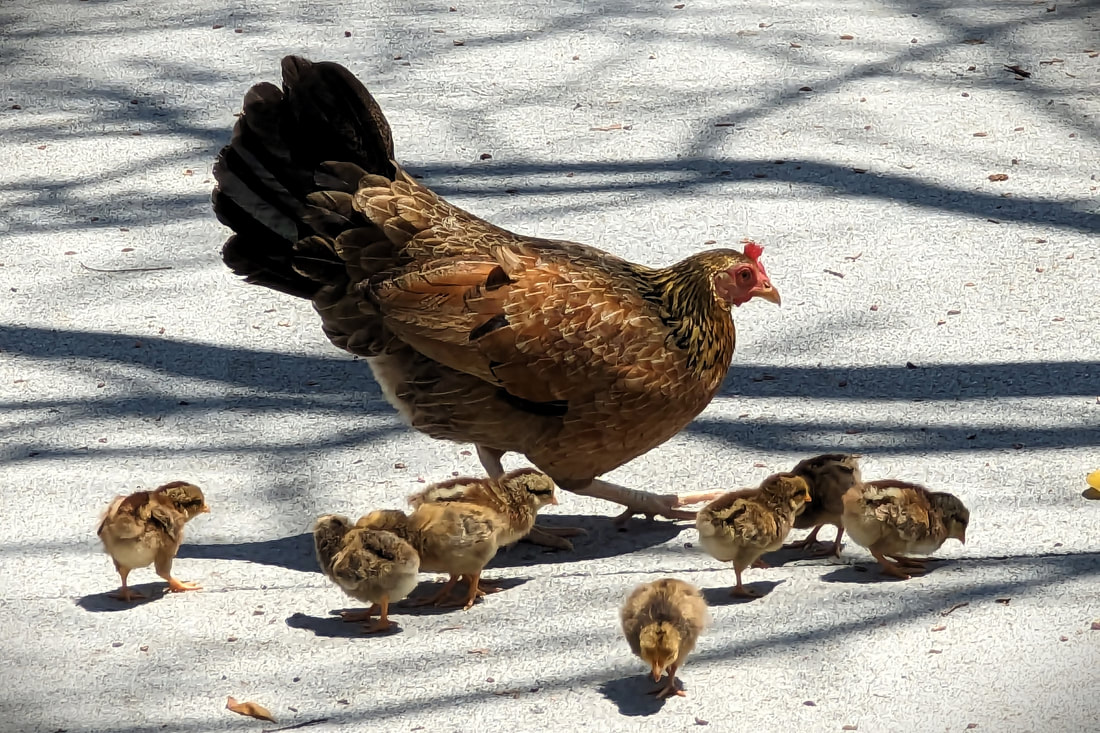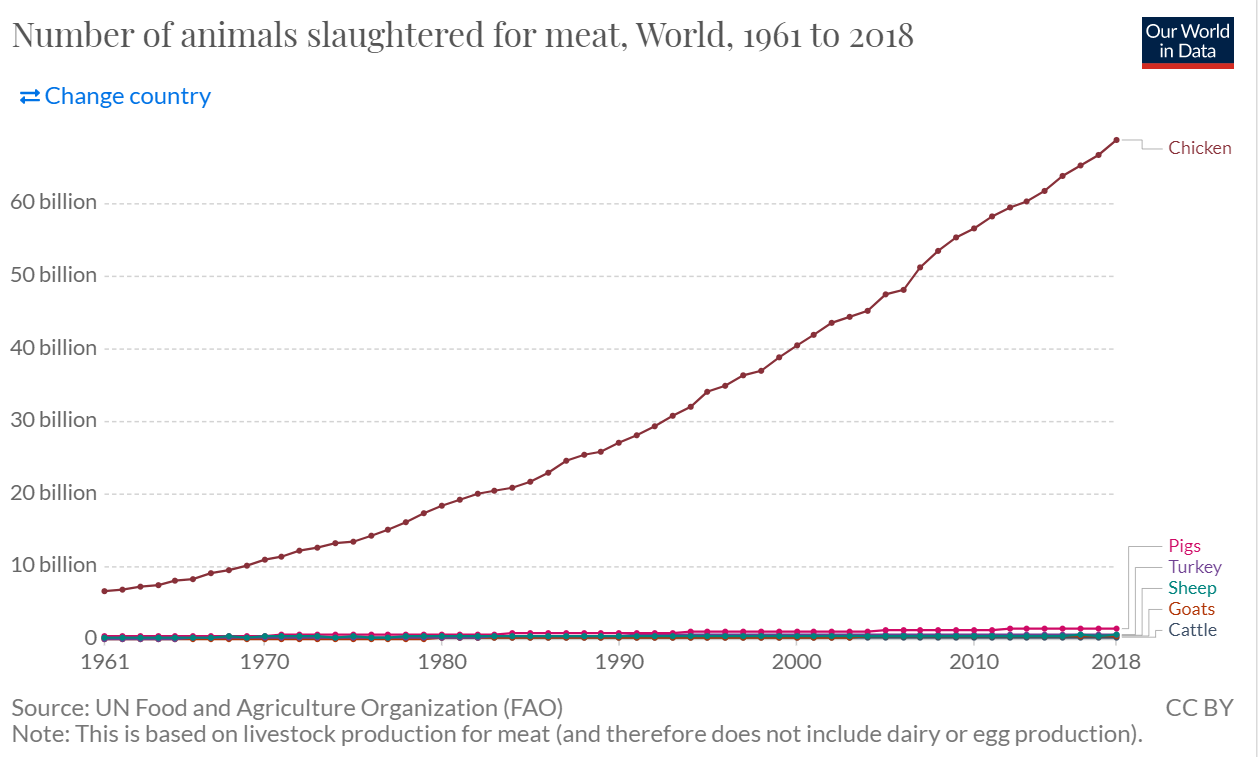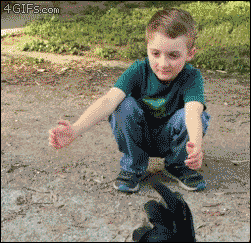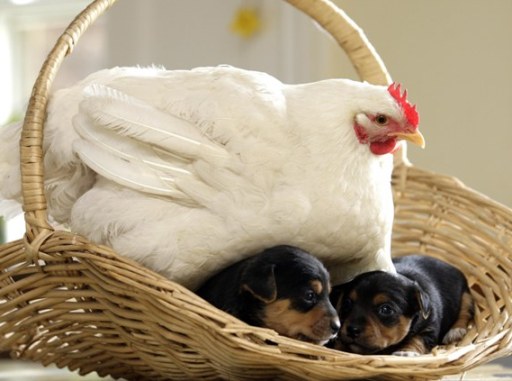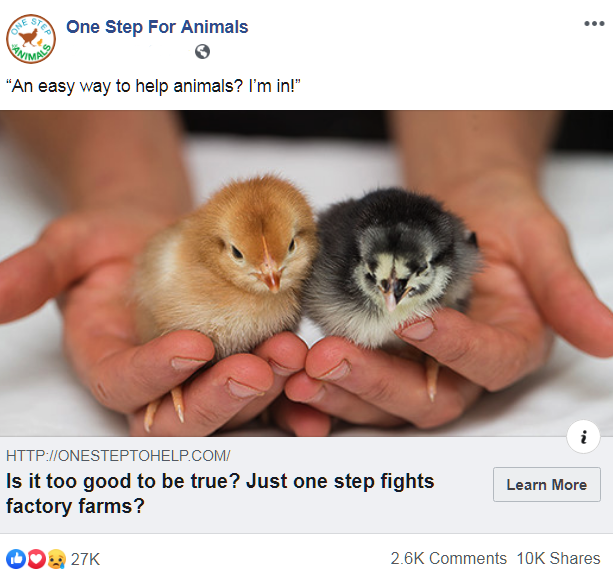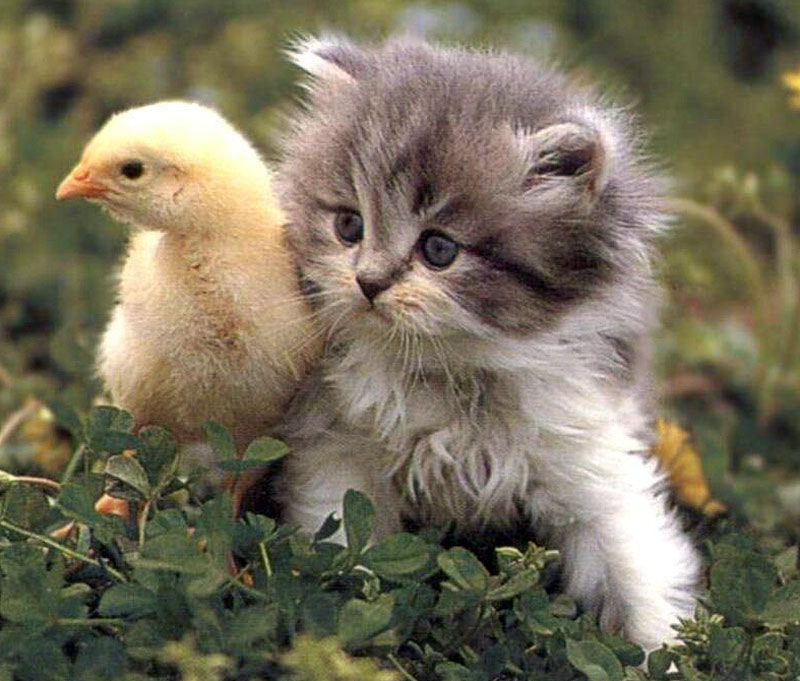|
I find myself eating less and less meat. I have a question: if we all stop eating meat or drastically reduce our intake, what happens to the animals? What happens to the farmers. I'm genuinely interested as to the long-term strategy? Thanks so very much for contacting One Step for Animals and for asking these questions in good faith. The direct answer to your question is that animals are bred in response to consumer demand. Unless everyone stopped eating animals all at once, the market signals will determine how many animals exist at any point in the future. Chickens raised for meat don’t even live two months, so the market can respond to increases and decreases in demand very quickly. A more nuanced question concerns the people who are involved in breeding, raising, and slaughtering animals for meat. It is probably best to hear directly from people who have changed away from raising chickens, which you can do here. That’s probably enough; below is just additional information. (If you’d like to hear more about what it is like to be a “chicken grower,” here is a video about the industry from someone who clearly has no sympathy for chickens themselves.) You ask specifically about the “long-term strategy.” The historical record is a good guide here. When our grandparents were alive, more than half of the population in the United States were involved in food production. Today, it is less than two percent. In 1872, a U.S. farmer fed about four other people. Today, the average farmer feeds more than 150 people. So agriculture has changed an incredible amount as technology has advanced and what people eat has changed. It is sure to continue to change in the future. Finally: Most of the farmed land in the United States is currently used to grow soy and corn to feed to chickens, turkeys, pigs, and cattle. Those crops have become global commodities that, like factory-farmed chickens, are produced with razor-thin profit margins. Growing food for direct human consumption is more profitable, as discussed here, along with some correct commentary on land that can’t be used to grow crops. Here is more on grazing cattle on marginal lands, although this is not One Step for Animals’ focus. We are purely trying to reduce the suffering in the world. Related Why Not Fish? What About Insects?
0 Comments
Earlier this year, One Step friend and great reporter Kenny Torrella published a very important article at Vox: How Germany is kicking its meat habit. In this article, he shows how meat reduction can hurt animals:
“[T]he steep decline in pork only resulted in a reduction of about one-sixth of a pig per person. However, the 12.5 percent increase in poultry consumption, which looks modest on the chart below, has resulted in almost one extra chicken farmed for each of Germany’s 83 million residents [every year].” This is not a victory, of course, and is why One Step for Animals promotes and pursues animal-focused advocacy. We can only make real progress when we focus on actual animals. You can help. Please click here to stand up for animals. From The Body: A Guide for Occupants:
Foodborne illness is America’s secret epidemic. Every year three thousand people, the equivalent of a small town, die of food poisoning in the United States, and around 130,000 are hospitalized. An investigation by the Food and Drug Administration in 2016 found that 84 percent of chicken breasts contained intestinal E. coli. According to a USDA study, about a quarter of all chicken pieces sold in stores are contaminated with salmonella. This Atlantic article not only makes the case for plant-based meat but for smarter real-world-based advocacy like One Step's harm-reduction efforts.
"For the past 50 years, Americans have responded to the case against eating animals mostly by eating more animals. "They have heard again and again about the moral and ecological costs of eating meat—from philosophers like Peter Singer and polemicists like Jonathan Safran Foer; from viral documentary footage of slaughterhouses and tortured poultry; from activist organizations like PETA and scientific reports on the fossil-fuel cost of producing a medallion of beef. "The collective sum of all these books and films and eco–guilt trips has made little difference. The share of Americans who call themselves vegan or vegetarian hasn’t increased in the past 20 years. In the 1970s, the typical American ate about 120 pounds of meat each year. In the 1990s, she ate about 130 pounds annually. Today, she eats more than 140 pounds a year, or about 2.5 pounds of meat every week—a record high, according to government estimates. … "The case against eating meat is a case for the mass renunciation of real human pleasure. (Yes, this is coming from someone who delights in little more than a well-cooked ribeye.) Like the case for reducing our carbon footprint, the vegan argument requires that the large majority of people sacrifice their lifestyle for outcomes that are often invisible to them as individuals. A cultural or moral revolution designed around the elimination of pleasurable options and the restriction of individual human choice is a hard sell, particularly in a country like the U.S., where materialist choice has been elevated to a kind of civic religion." You support One Step to save animals. But what do the numbers say? We had previously explored this question but wanted to update the calculations, given all the work we have been doing to understand and optimize how much impact your dollars have. Every day, our various landing page ads (like the one below) are seen by tens of thousands of individuals who are targeted for having some interest in animals (dogs, cats, horses, etc.). People can then click through to watch the video. To be highly conservative in our estimates of impact, we assume each view of the ad and each view of the video have absolutely no impact. Instead, we assume that only individuals who see an ad and watch the video and click to download the Guide actually make any change. Assume that they react, on average, the way our poll respondents do, and assume they maintain that change for only for an average of five years. With all those conservative assumptions, it comes down to: 4.5¢ per chicken saved. Or more than 2,000 chickens saved per $100 contributed. Given how people say they react to One Step's message, your $100 also saves over 750 vertebrate fish (as per Harish's estimates), and more than 80 layer hens (as well as turkeys, pigs, and cows). You can change the assumptions all you like, but given the low cost per person downloading the Guide and the survey results, it is extremely cost-effective to save animals via contributions to One Step's work. Given that every dollar you donate is truly doubled, you actually save many more animals, whatever assumptions you choose. We greatly appreciate that you choose to make our work part of how you help animals. You can know we will continue to do our best to give you the greatest return on your donations every day. We ran a survey via Survey Monkey asking this question:
If One Step's message has ever influenced you or someone you know, what is your (or their) current consumption of the following products? Here are the results, with each number being the percentage of respondents who gave each answer (e.g., 71% said that they now eat much less or no red meat, 51% saying they eat many more plant-based meals, etc.):: For everyone who thinks that eating chickens is the best choice from the environment, this Life Cycle Assessment shows MorningStar's plant-based chicken has the following advantages over slaughtered chicken:
Note that MorningStar is phasing eggs out of all their products. Several supporters have asked if we know how people react to One Step for Animals' harm reduction message. Specifically, they are curious if people shift to other types of meat or choose meat-free meals instead. We ran an online poll and found:
If you or someone you know had a reaction to One Step's message, what was it? Thanks! 4% Ate more red meat. 96% Ate more meat-free meals. |
|

